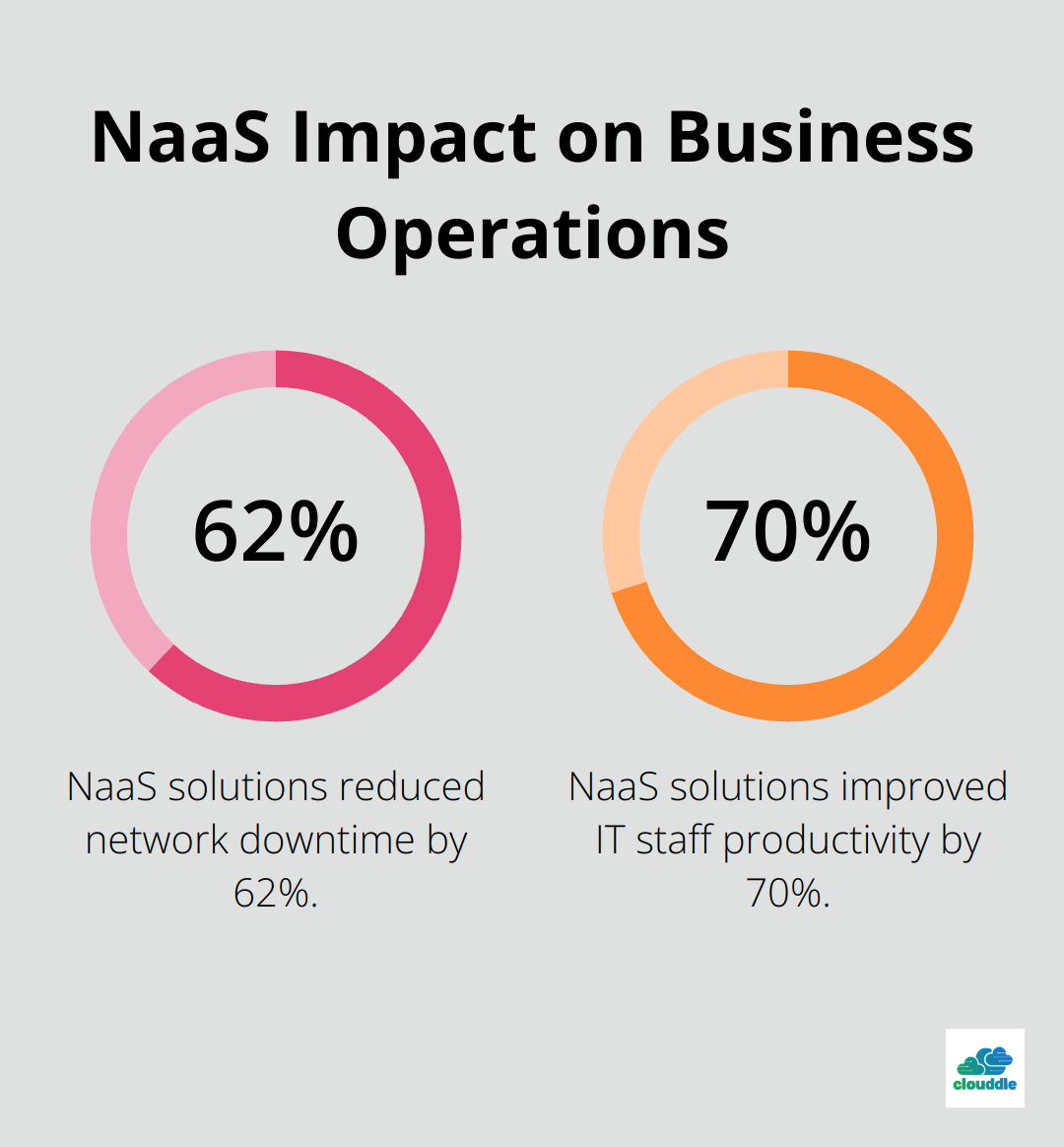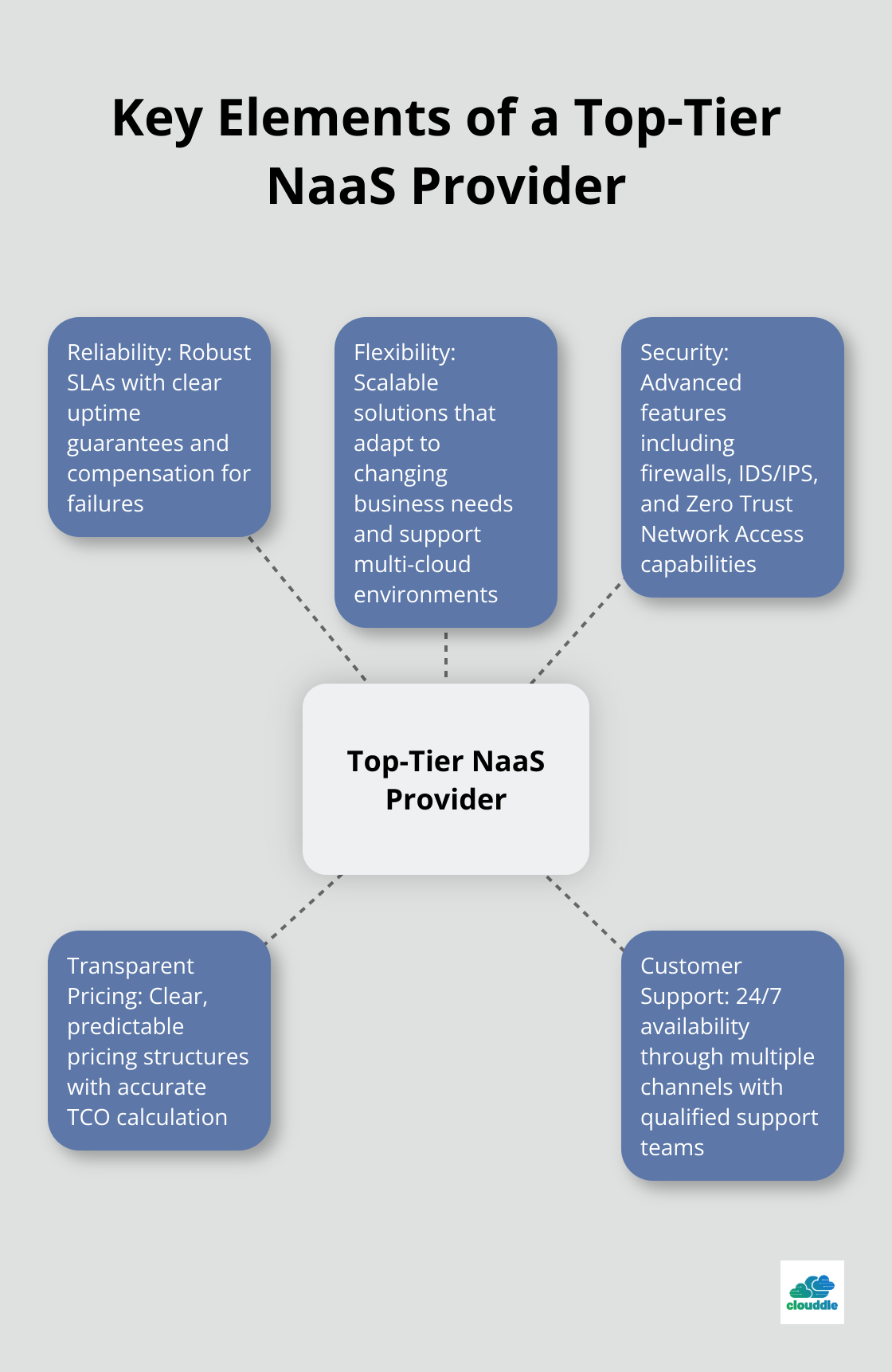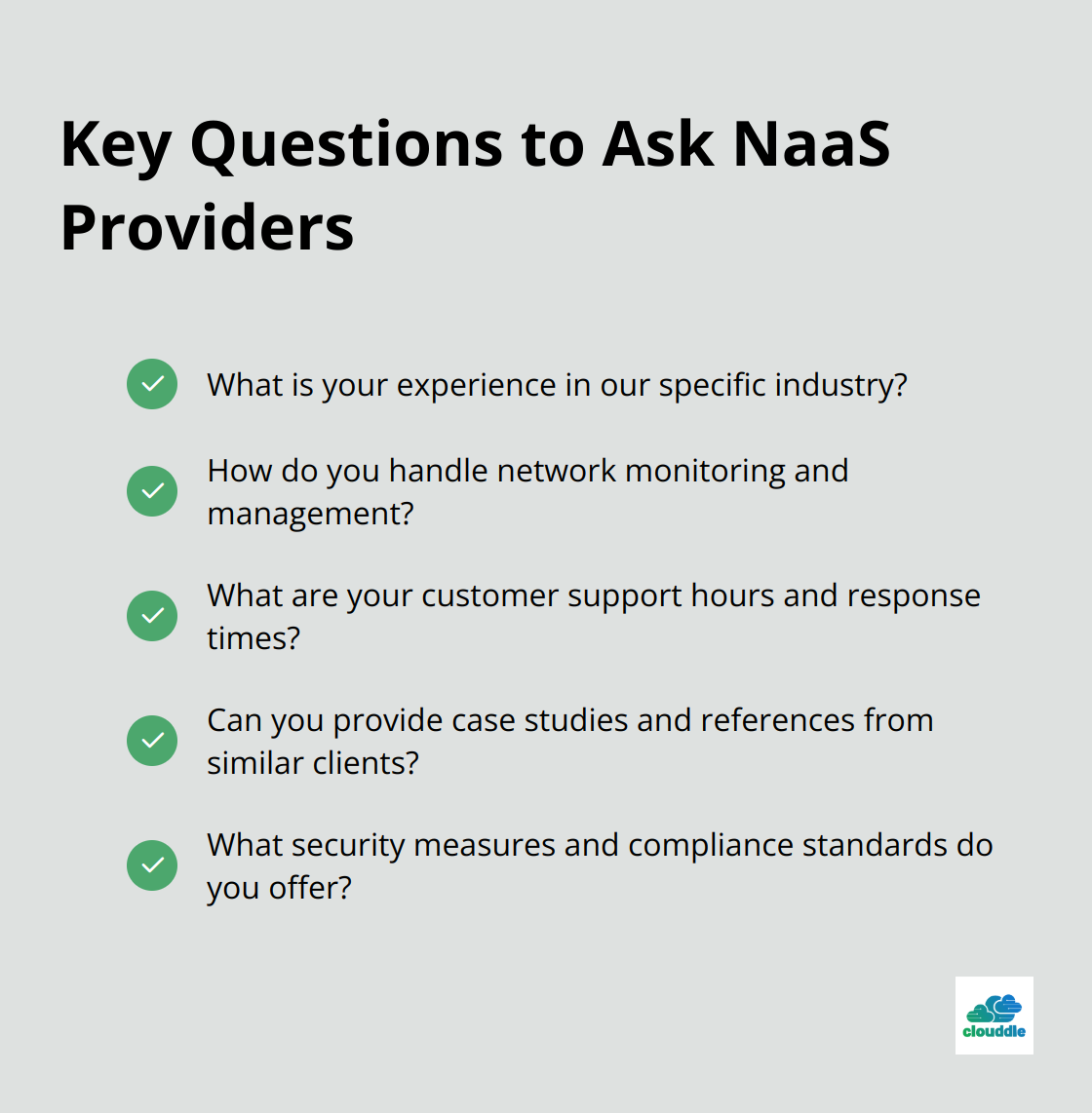Choosing the right Network as a Service (NaaS) provider is a critical decision for businesses looking to modernize their network infrastructure. The market is flooded with options, each claiming to offer the best solution.
At Clouddle, we understand the challenges companies face when selecting a NaaS provider. This guide will help you navigate the selection process, ensuring you find a partner that aligns with your unique business needs and goals.
What is Network as a Service?
Defining NaaS
Network as a Service (NaaS) transforms how businesses approach their networking needs. This cloud-based model allows organizations to outsource their entire network infrastructure and management to a third-party provider. NaaS encompasses a range of services, including WAN connectivity, network security, and bandwidth on demand.
Key Components of NaaS
A central component of many NaaS offerings is SD-WAN, which optimizes network performance for cloud applications. According to a Gartner report, by 2024, over 60% of software-defined, wide-area network (SD-WAN) customers will implement a secure access service edge (SASE) architecture, which allows an organization to support dispersed remote and hybrid users automatically by connecting them to nearby cloud gateways.
Measurable Benefits for Businesses
NaaS offers substantial and quantifiable benefits. An IDC study found that organizations using NaaS solutions experienced a 62% reduction in network downtime and a 70% improvement in IT staff productivity. These improvements directly translate to cost savings and enhanced business operations.

NaaS provides unparalleled scalability. Businesses can quickly adjust their network resources based on demand, without significant capital expenditure. This flexibility proves particularly valuable for companies with seasonal fluctuations or rapid growth trajectories.
NaaS vs Traditional Networking
The contrast between NaaS and traditional networking solutions is stark. Traditional models require substantial upfront investment in hardware and ongoing maintenance costs. NaaS, however, operates on a subscription-based model. This pricing model charges regular fees for licensing the SD-WAN solution and commonly includes support services as part of the subscription.
NaaS providers typically offer more advanced security features than most businesses can implement on their own. Many NaaS solutions include built-in DDoS protection and AI-driven threat detection, capabilities that would be cost-prohibitive for many organizations to develop in-house.
Real-World Application
To illustrate the practical impact of NaaS, consider a mid-sized retail chain with 50 locations. By adopting a NaaS solution, they could centralize network management, ensure consistent security policies across all stores, and dynamically adjust bandwidth during peak shopping seasons. This level of flexibility and control would challenge and cost traditional networking approaches.
As we move forward to explore the intricacies of choosing the right NaaS provider, it’s essential to consider the key factors that will influence your decision. Let’s examine the critical elements you should evaluate when selecting a NaaS provider that aligns with your business needs.
What Makes a Top-Tier NaaS Provider?
When you select a Network as a Service (NaaS) provider, several critical factors can significantly impact your experience. Let’s explore the key elements you should evaluate to find a NaaS provider that aligns with your business needs.

Reliability and Uptime Guarantees
The foundation of any NaaS offering is its reliability. You should look for providers that offer robust Service Level Agreements (SLAs) with clear, measurable uptime guarantees. Lumen offers on-demand network and connectivity services that allow you to quickly create scalable, flexible internet, Ethernet and IP VPN connections.
Don’t take the number at face value. Examine the fine print of the SLA. How does the provider define downtime? What compensation do they offer if they fail to meet their guarantees? With such high stakes, you need a provider that stands firmly behind their promises.
Network Flexibility and Scalability
Your network needs today might not reflect your needs tomorrow. The best NaaS providers offer solutions that can scale seamlessly with your business growth. You should look for providers that allow you to adjust bandwidth on-demand, add or remove services without lengthy contract negotiations, and support multi-cloud environments.
A retail business, for example, might need to rapidly scale up their network capacity during holiday seasons. A flexible NaaS solution should accommodate this without requiring long-term commitments to higher capacity levels.
Comprehensive Security Features
In today’s threat landscape, security isn’t an add-on-it’s a necessity. Top-tier NaaS providers integrate advanced security features directly into their offerings. This should include (at minimum) built-in firewalls, intrusion detection and prevention systems (IDS/IPS), and encrypted data transmission.
You should look for providers that offer Zero Trust Network Access (ZTNA) capabilities. According to Gartner, zero trust network access is the security framework of the future and will replace virtual private networks by 2025.
Transparent Pricing and TCO
While cost shouldn’t be the only factor in your decision, it’s undoubtedly an important one. The best NaaS providers offer transparent pricing models that allow you to accurately calculate your Total Cost of Ownership (TCO).
Be cautious of providers that offer suspiciously low upfront costs. Often, these come with hidden fees or escalating costs over time. Instead, you should look for providers that offer clear, predictable pricing structures. Some providers offer flexible contracts and bundled solutions that can significantly reduce your overall TCO.
When you evaluate costs, consider not just the direct expenses, but also the potential savings.
As you continue your search for the ideal NaaS provider, you’ll need to ask specific questions to ensure they meet these critical factors. In the next section, we’ll outline the key questions you should pose to potential NaaS providers to thoroughly assess their capabilities and fit for your business.
Probing Questions for NaaS Providers
When evaluating potential Network as a Service providers, it’s crucial to ask the right questions to ensure they can meet your specific needs. Here are some key areas to probe:

Industry Expertise
Ask potential NaaS providers about their experience in your specific industry. If you operate in the hospitality sector, you need a provider who understands the unique networking challenges of hotels. Request specific examples of how they solved problems for businesses similar to yours. This information will reveal their ability to meet your particular needs.
Network Monitoring and Management
Inquire about the provider’s network monitoring and management practices. Ask how they detect and respond to issues. Request their average response time. Look for providers that offer proactive network monitoring, security policy enforcement, advanced firewall and packet inspection capabilities, and modeling of the network. Ask about their mean time to resolution (MTTR) for different types of network issues.
Customer Support
The quality of customer support can significantly impact your NaaS experience. Ask about their support hours, response times, and escalation procedures. Do they provide 24/7 support? What channels are available for support (phone, email, chat)? Request details about their support team’s qualifications and certifications. Inquire about how their NaaS services are designed to help streamline purchasing and provisioning, simplify network management, enable flexible scalability and deliver secure, reliable solutions.
Case Studies and References
Request case studies or references from existing clients. These real-world examples can offer valuable insights into the provider’s performance and reliability. Ask for references from clients in your industry or with similar network requirements. When speaking with references, inquire about their experience during implementation, ongoing support, and any challenges they’ve faced.
Security Measures
Network security is paramount, so investigate the provider’s security measures thoroughly. Ask about their encryption standards, firewall capabilities, and intrusion detection systems. Inquire about their compliance with industry standards relevant to your business (such as PCI DSS for businesses handling credit card data).
Try to find a NaaS provider that meets your current needs and can support your future growth. Ask tough questions – a reputable provider will welcome the opportunity to demonstrate their expertise and capabilities.
Final Thoughts
Selecting the right Network as a Service provider can significantly impact your business operations, security, and bottom line. The ideal NaaS provider should offer reliability, scalability, robust security, and transparent pricing (with a proven track record in your industry). They should also provide responsive, round-the-clock support to meet your current needs and adapt to future challenges.
We at Clouddle understand the complexities of modern networking needs. Our Network as a Service solution combines technology with industry expertise to deliver seamless operations and enhanced security. We offer flexible contracts, bundled solutions, and customer support to ensure your network infrastructure supports your business growth.
Take the time to research, ask probing questions, and compare options carefully when choosing a Network as a Service provider. The right choice will streamline your current operations and position your business for future success in an increasingly connected world. Your network is the backbone of your digital operations – choose a provider that treats it with the importance it deserves.


